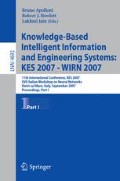Abstract
Knowledge ‘objects’ are constructors for building chunks of knowledge that enable the hidden links in the knowledge to be identified. A single operation for objects enables these hidden links to be removed from the knowledge thus simplifying maintenance. Analysis of the maintenance links shows that they are of four different types. The density of the maintenance links is reduced by transforming that set into an equivalent set. In this way the knowledge base maintenance problem is analysed and simplified. A side benefit of knowledge items as a formalism is that they contain knowledge constraints that protect the knowledge from unforeseen modification.
Access this chapter
Tax calculation will be finalised at checkout
Purchases are for personal use only
Preview
Unable to display preview. Download preview PDF.
References
Debenham, J.: Why use a unified knowledge representation? In: Monostori, L., Váncza, J., Ali, M. (eds.) IEA/AIE 2001. LNCS (LNAI), vol. 2070, Springer, Heidelberg (2001)
Iglezakis, I., Reinartz, T., Roth-Berghofer, T.: Maintenance Memories: Beyond Concepts and Techniques for Case Base Maintenance. In: Advances in Case-Based Reasoning, pp. 227–241. Springer, Heidelberg (2004)
Debenham, J.: Fuzzy degrees of knowledge integrity. In: Proceedings 9’th International Conference on Information Processing and Management of Uncertainty in Knowledge-Based Systems IPMU-2002, pp. 1391–1398 (2002)
Debenham, J.: A rigorous approach to knowledge base maintenance. In: Proceedings Sixteenth International Conference on Industrial and Engineering Applications of Artificial Intelligence and Expert Systems IEA/AIE-2003, Loughborough, UK, pp. 219–228 (2003)
Katsuno, K., Mendelzon, A.: On the difference between updating a knowledge base and revising it. In: KR’91. Proceedings Second International Conference on Principles of Knowledge Representation and Reasoning, Morgan Kaufmann, San Francisco (1991)
Barr, V.: Applying reliability engineering to expert systems. In: Proceedings 12’th International FLAIRS conference, pp. 494–498 (1999)
Chen-Burger, Y.-H.: Sharing and Checking Organisation Knowledge. In: Knowledge Management and Organizational Memories, Kluwer Academic, Dordrecht (2002)
Jantke, K., Herrmann, J.: Lattices of knowledge in intelligent systems validation. In: Proceedings 12’th International FLAIRS conference, Florida, US, pp. 499–505 (1999)
Darwiche, A.: Compiling knowledge into decomposable negation normal form. In: Proceedings International Joint Conference on Artificial Intelligence IJCAI’99, Stockholm, Sweden, Stockholm, Sweden, pp. 284–289 (1999)
Debenham, J.: Knowledge Engineering — Unifying Knowledge Base and Database Design. Springer, Heidelberg (1998)
Johnson, G., Santos, E.: Generalizing knowledge representation rules for acquiring and validating uncertain knowledge. In: Proceedings 13’th International FLAIRS conference, Florida, US, pp. 186–191 (2000)
Ramirez, J., de Antonio, A.: Semantic verification of rule-based systems with arithmetic constraints. In: Ibrahim, M., Küng, J., Revell, N. (eds.) DEXA 2000. LNCS, vol. 1873, pp. 437–446. Springer, Heidelberg (2000)
Author information
Authors and Affiliations
Editor information
Rights and permissions
Copyright information
© 2007 Springer-Verlag Berlin Heidelberg
About this paper
Cite this paper
Debenham, J. (2007). Building Maintainable Knowledge Bases with Knowledge Objects. In: Apolloni, B., Howlett, R.J., Jain, L. (eds) Knowledge-Based Intelligent Information and Engineering Systems. KES 2007. Lecture Notes in Computer Science(), vol 4692. Springer, Berlin, Heidelberg. https://doi.org/10.1007/978-3-540-74819-9_35
Download citation
DOI: https://doi.org/10.1007/978-3-540-74819-9_35
Publisher Name: Springer, Berlin, Heidelberg
Print ISBN: 978-3-540-74817-5
Online ISBN: 978-3-540-74819-9
eBook Packages: Computer ScienceComputer Science (R0)

